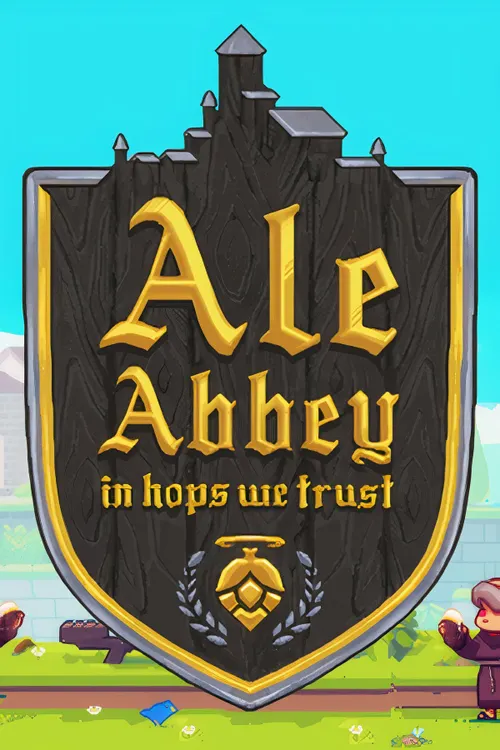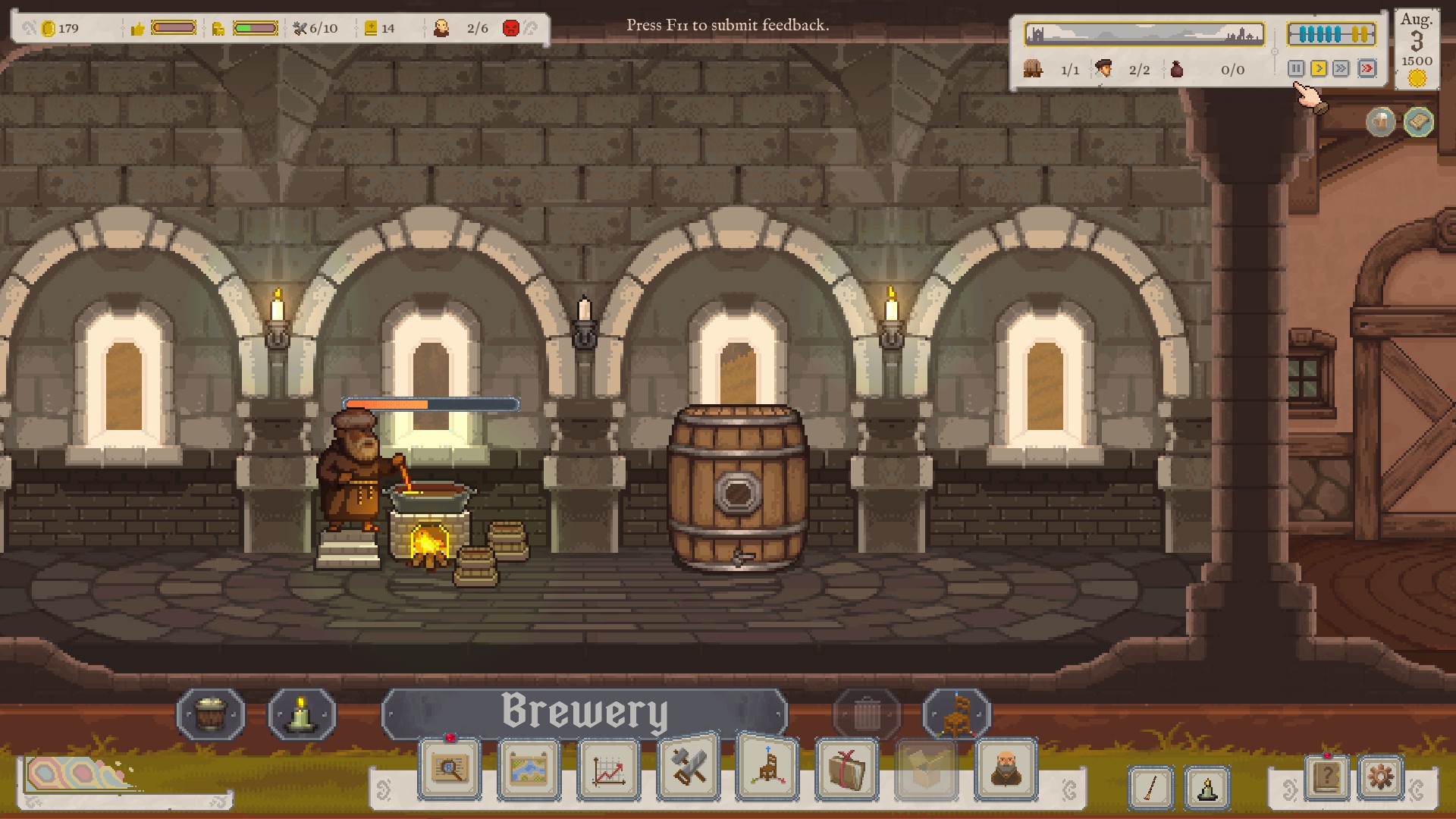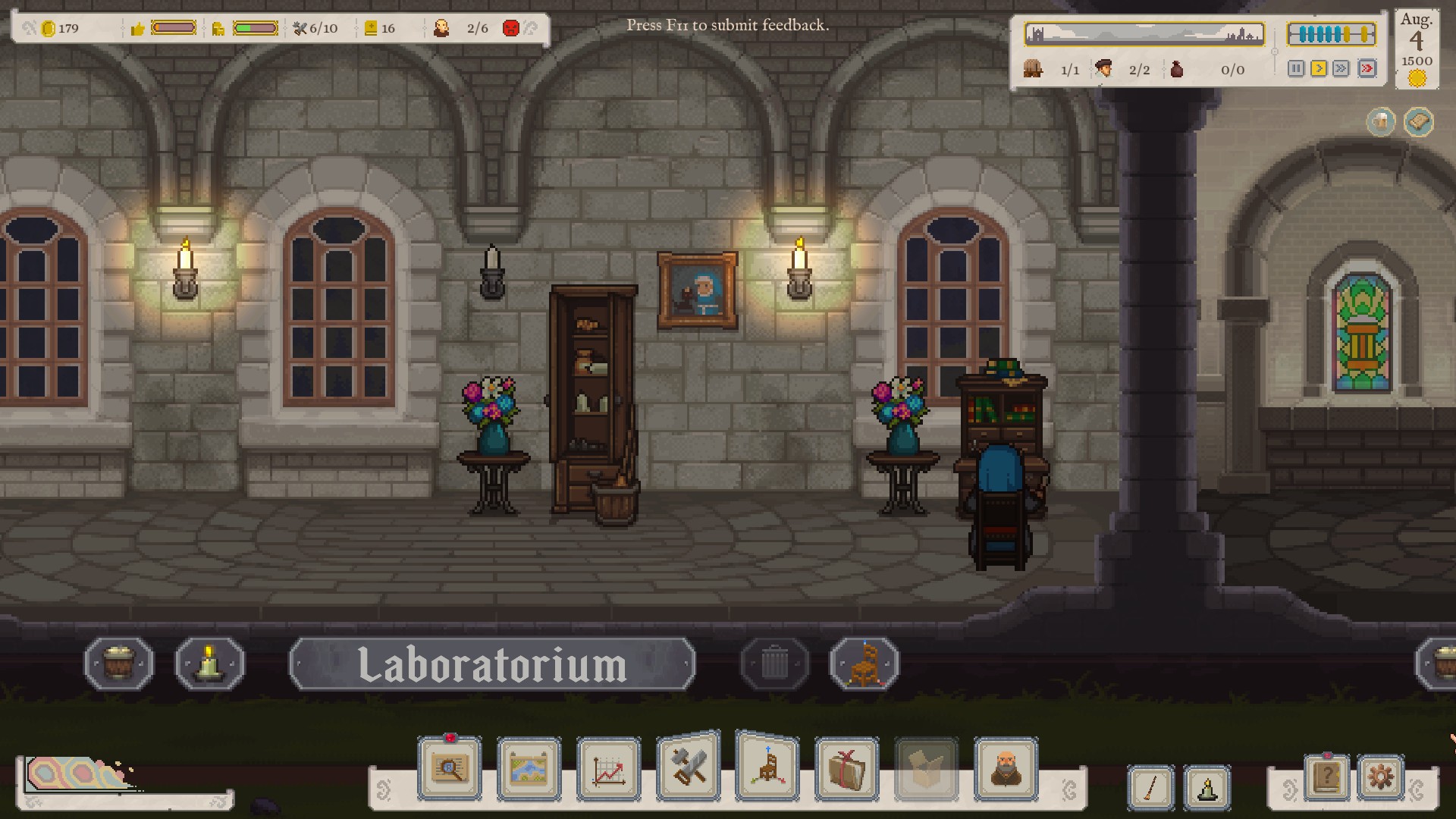Search
[{{{type}}}] {{{reason}}}
{{/data.error.root_cause}}{{{_source.title}}} {{#_source.showPrice}} {{{_source.displayPrice}}} {{/_source.showPrice}}
{{#_source.showLink}} {{/_source.showLink}} {{#_source.showDate}}{{{_source.displayDate}}}
{{/_source.showDate}}{{{_source.description}}}
{{#_source.additionalInfo}}{{#_source.additionalFields}} {{#title}} {{{label}}}: {{{title}}} {{/title}} {{/_source.additionalFields}}
{{/_source.additionalInfo}}- Details
- Category: Computer
- By Daniel Cullen
- Hits: 1734
Ale Abbey (PC) (Preview)

Ale Abbey
Developed By: Hammer & Ravens
Published By: Shiro Unlimited
Released: February 18, 2025
Available On: Microsoft Windows
Genre: Simulation
ESRB Rating: none specified
Number of Players: Singleplayer
Price: $14.99
Go, eat your food with gladness, and drink your wine with a joyful heart, for God has already approved what you do.
- Ecclesiastes 9:7
I want to thank the developers Hammer & Ravens for graciously providing a review key for this title.
While I generally prefer cheese to libations, I've always been interested in the process of fermentation to make foods. This controlled rotting process has resulted in many fine delicacies throughout history. Ale Abbey is a simulation of how this process has affected the making of alcohol. And, from what I've seen, is easy to get into yet very fun and in-depth.
Ale Abbey is a game that covers a topic of great culinary significance. Historically, abbeys and monasteries throughout Europe have produced some of the finest cheeses and alcohols known to modern cuisine. Historically, these places had to be self-sustaining enterprises despite receiving tithes. Those tithes often included milk and grain from local farms. Since grain and milk can spoil, these clerical orders would utilize the process of fermentation to transform these goods into cheese and various alcoholic beverages. Fermentation is a controlled rotting that turns these foods into long-lasting goods that even today are often highly prized in the culinary world.
Ale Abbey is a simulation of this historical process, taking place in the fictional Fermentine Abbey. The goal of this place is simple. Much like its real historical antecedents, it must become a profitable institution, turning grains into delicious alcoholic beverages for sale to local markets. With careful management, you can turn the labors of the servants of God into a thriving business that can sustain the costs of the maintenance of the abbey and provide sustenance to the locals.

Strong Points: Excellent simulation of a real-world historical process that shows a love for a craft; great music
Weak Points: Needs some tutorial improvements
Moral Warnings: Gameplay is a simulation of the brewing and consumption of alcohol
Using an overseer perspective, you need to do various things to manage the abbey. You need to build proper rooms for various functions of the abbey. You need to manage the various monks, nuns, and other staff to ensure its smooth operation, keep careful watch over the finances to ensure the solvency of its operations, and otherwise keep the Fermentine Abbey productive and happy.
There are many things involved in this simulation. Using a real-time system (which can be sped up or paused as needed), you can watch the operations of the abbey. You will need to design recipes for alcohols to brew, decide the mix of ingredients, and the staff to oversee their brewing and creation. The rooms of the abbey will require maintenance to ensure their cleanliness and efficiency, and staff morale is important to monitor. The game comes with a patient in-game tutorial, with the abbey bishop walking you through the basics. You will need to carefully balance the selling of your vintages, with some to be stored to age and some to be retained for the staff, as, with proper moderation, allowing them to sample the fruits of their labors will improve morale.
Graphically, this uses a colorful, western cartoon pixel art style. The various figures of the abbey are well animated, showing their various actions and moods as they work, allowing you to get an idea of how happy and productive they are to manage it. The user interface allows the use of both a pixel font and a scalable modern font for larger screens for enhanced readability. I recommend the latter for high resolutions and for portable use on platforms like the Steam Deck.
The sounds and music have a very classical medieval feel, especially with the intent to have a "sacred" feel. Clint Bajakian, the musical engineer, mentioned in an official interview he wanted to lean more into the ecclesiastical and church-themed music as opposed to the merry minstrel theming, given the setting is an abbey. With that in mind, there are not only gentle flutes and other instruments that would be standard in a medieval setting, but there is also a firm undercurrent of choir music. As for the sound effects, they strove to avoid anything that sounds synthesized, opting instead for natural sound effects to capture the Middle-Aged aesthetic. Having listened to this, I definitely felt like I was in a church, listening to the clerical staff hard at work while the choir was at practice.

Higher is better
(10/10 is perfect)
Game Score - 88%
Gameplay - 17/20
Graphics - 8/10
Sound - 9/10
Stability - 5/5
Controls - 5/5
Morality Score - 96%
Violence - 10/10
Language - 10/10
Sexual Content - 10/10
Occult/Supernatural - 10/10
Cultural/Moral/Ethical - 8/10
This game is primarily mouse and keyboard-driven. The interface will require a lot of clicking on various menus to place objects and rooms, and direct the functions of the abbey. The keyboard will be used when designing new brewing recipes, in order to give them names. There is no controller support, though it will work on the Steam Deck, with the right analog stick serving as the mouse (clicking this will serve as the left mouse click).
Stability is very solid. Requirements are incredibly modest. It will run natively on Windows, and will also run out of the box on Linux and the Steam Deck via Steam Proton. The developers have a feedback contribution option in-game and have been willing to accept feedback via other forums, such as their Discord. More formal work to ensure Steam Deck functionality was confirmed to be in the works.
Some final notes. This is an Early Access title, and it has a few rough edges. The tutorials need a bit more elaboration in areas to explain some mechanics. I'd also say finer-grained options to control the game speed would be a welcome feature. Lastly, some of the more technical aspects of the brewing process need a bit more coverage, as achieving the proper mix for brews is a bit of trial and error due to a bit of glossing over how to create them in the tutorials.
Morally, this only has one notable issue. Its very premise concerns the making of alcoholic beverages. Historically, this was the province of monasteries and abbeys, and even in Biblical times the making of wine was not only sanctioned by God, it was also offered before His altar as a drink offering. With that in mind, this game is a mere simulation of the business aspects of making alcohol. While the real life doing so with prudence and moderation is recommended by the Bible, we encourage those who are tempted to drink to drunkenness in real life to avoid this game. Even those who drink casually who play this we advise not allowing this otherwise harmless and charming game to become a snare to drunkenness, per these wise words from the Bible:
Do not get drunk on wine, which leads to debauchery. Instead, be filled with the Spirit. - Ephesians 5:18
Overall, it's an admittedly Early Access title, and it clearly has some areas that need some work, but the developers have proven able and willing to put in that effort. Technically, it has very little wrong with it outside of the possible adjustments I recommended. Morally, it may be of concern for those who are tempted to real-world drunkenness. Provided the player can keep a sober mind (both in-universe and in real life) when playing this title, it comes with a firm recommendation.






